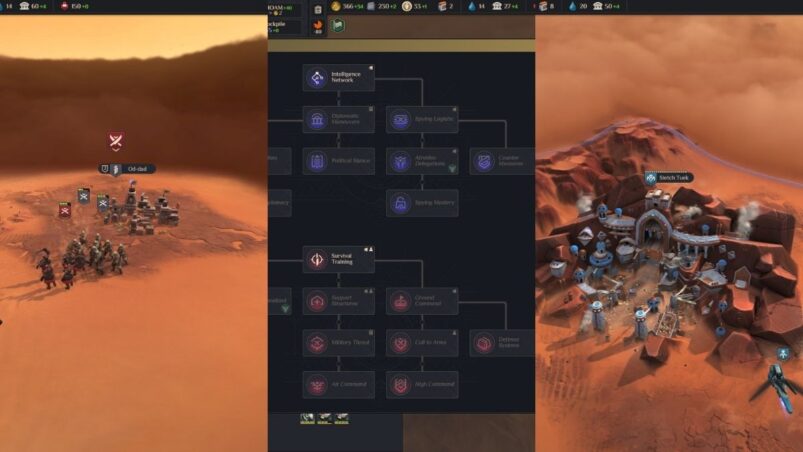The 4X subset of strategy gaming is perfect for Dune’s resource-centered world, grand strategic decisions, and intrigue. In Dune: Spice Wars, players will need to utilize and manage a myriad of resources to ensure military, diplomatic, or political victory in the race to dominate Arrakis. You’ll definitely need a headstart over your opponents and understand how all of Dune’s riches fit together into your strategy.
Here’s everything you should know about resources in Dune: Spice Wars.
Dune: Spice Wars Resources
Village
Most resources are tied to the land and deserts of Arrakis, so the regions of this vital planet are a crucial resource to consider. Except for the Deep Desert, all regions will have a central village that acts as a central point of influence over the given region.
To control a region, you must take control over the village via a direct military attack with your forces or by some faction special ability, like the Atreides’ Peaceful Annexation option. All villages will have a militia force associated with it, with faraway villages usually having large garrisons, so be ready to fight increasing resistance as you expand across Arrakis’ land. However, if you’re not interested in taking control of a specific region you can also use villages as a source of income by pillaging them to give you a sum of Solari (more on that later).
Spice
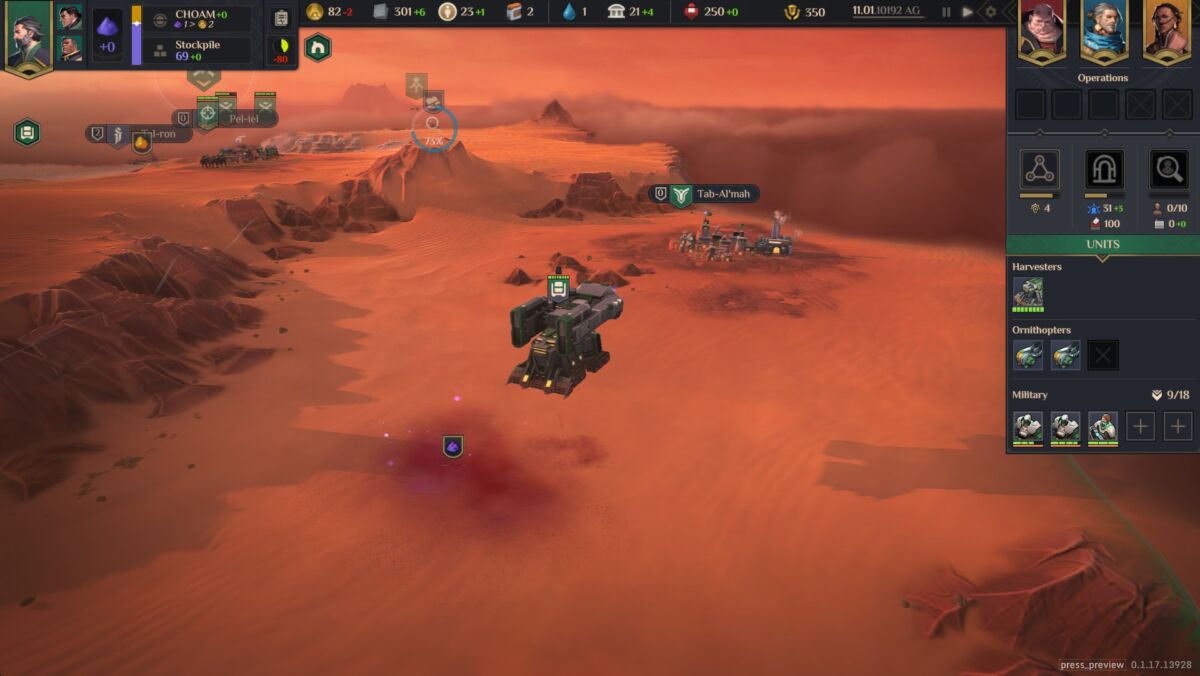
Arguably the most important resource in the game, Spice is the lifeblood of the Imperium and the enigmatic Spacing Guild. The Spice has two major parts to it: the Spice Tax for the Imperial Houses or bribes for Smugglers and Fremen, and sales to CHOAM, the central intergalactic corporation responsible for all commerce.
Every 20 days, all factions must pay an ever-increasing sum of Spice to continue operating on Arrakis, with factions failing to pay the required sum suffering penalties. Whatever Spice players don’t need for the Spice Tax or bribe can be sold to CHOAM for a profit of Solari to bolster the economy.
You can gain Spice in a variety of ways, such as exploiting Spice fields in regions, exploring points of interest, trading with other factions, and enacting agent missions.
Solari
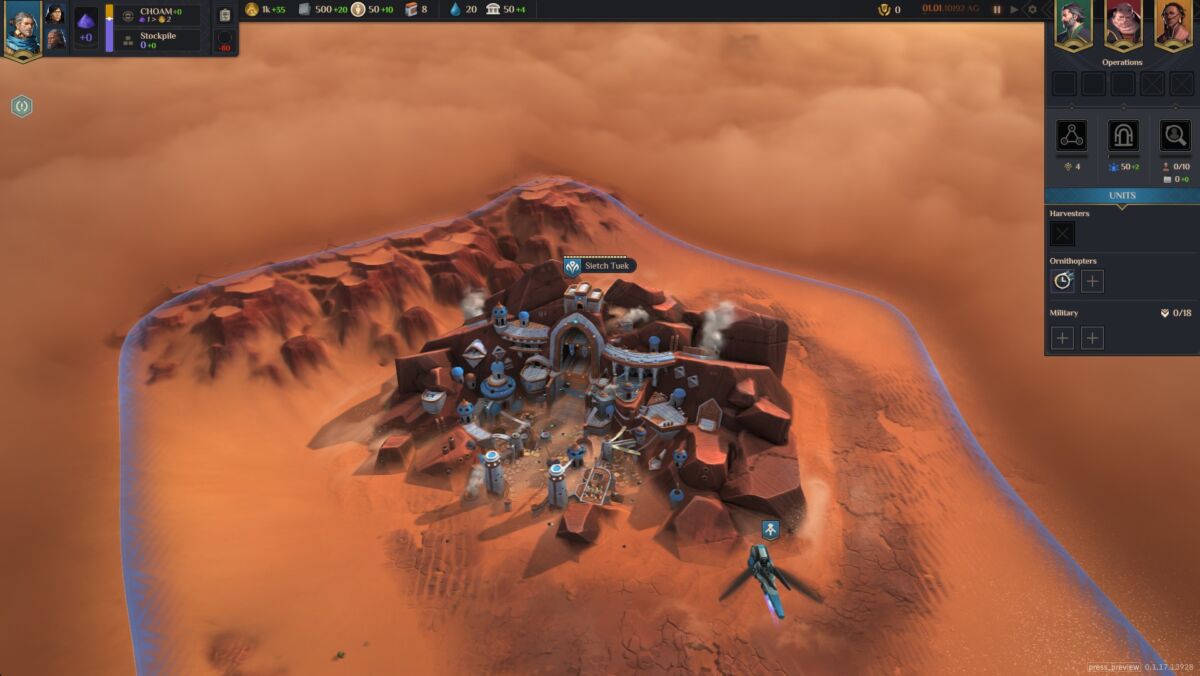
Solari is the main cash currency used by the Imperium, and in Dune: Spice Wars, it’s mainly used to purchase units, build structures, and also pay for their upkeep and maintenance. You can get Solari from a great variety of sources, such as selling Spice to CHOAM, technology research, pillaging villages, trading, exploring points of interest, passive region features, specific building exploitations, agent infiltration assignments to CHOAM, and intrigue missions.
Plascrete
Plascrete is the main construction material of the Dune universe and is perhaps the most important resource for the development of your presence on Arrakis. Players will use this resource to raise structures and pay for their upkeep. Sources of plascrete include buildings, points of interest, faction trading, and agent missions.
Manpower
Manpower represents your faction’s ability to mobilize the population to field army units, deploy militia garrisons, pay for military upkeep, and activate abilities. Players can increase their manpower by constructing specific buildings, passive region features, and agent infiltration assignments to the Spacing Guild.
Fuel Cells
Most factions in Dune: Spice Wars operate vehicles and heavy machinery that require sources of power and energy to keep them operating and that’s where Fuel Cells come in. Units such as ornithopters and drones, and buildings such as refineries and airfields, require Fuel Cells to function. Fuel Cells can only be produced in the designated factory.
Water
After Spice, Water is perhaps the next most important resource on Arrakis. Water is critical for claiming new villages, recruiting and maintaining units, and finally trading with neutral Fremen Sietches for additional resources. You can only get Water from buildings and agent missions.
Authority
Authority represents your faction’s ability to enact its will upon the land, as it’s needed to claim villages. In addition, this resource is needed to uphold the diplomatic treaties you form with other factions. Authority can be gained by interacting with points of interest, assigning agents to Arrakis infiltration, and allying with neutral Fremen Sietches.
Landsraad Standing
The Landsraad Standing resource is only available to the two Imperial houses of Atreides and Harkonnen, though the Smuggler faction can unlock this option in later stages of the game. This resource represents how influential and how well regarded the faction is amongst the rest of the Imperium’s houses.
Higher levels of standing grant bonus resources and unlock powerful charter resolutions that could even lead to diplomatic victory with the Governorship of Dune resolution. Landsraad Standing can only be gained through buildings, but primarily through successfully passing resolutions in the Landsraad.
Hegemony
Hegemony abstractly represents your faction’s direct influence over the entirety of Arrakis. In fact, one way to win a game is by earning 50000 Hegemony. Gaining Hegemony unlocks additional benefits for each faction and can even let you build powerful district buildings in your main base.
Hegemony can be earned through several pathways available to all factions, as well as a unique way associated with each faction. The general ways of earning hegemony are through controlling regions, claiming special regions, paying the Spice Tax or bribe, enacting Landsraad Charters (for those who have access to them), defeating enemy faction units, building craft workshops, and owning CHOAM shares through agent missions.
Faction-specific ways of earning Hegemony are as follows: for the Atreides – ally with Fremen Sietches, for the Harkonnens – spend intel on agent mission and operations, for the Smugglers – pillage villages, and for the Fremen – produce water.
Command
The Command rating resource represents the faction’s ability to field their armed forces to operate on Arrakis’ land. It’s essentially a population cap system for your military. The Command rating can increase through technology, assigning agents to counterintelligence, and building structures in the main base.
Units
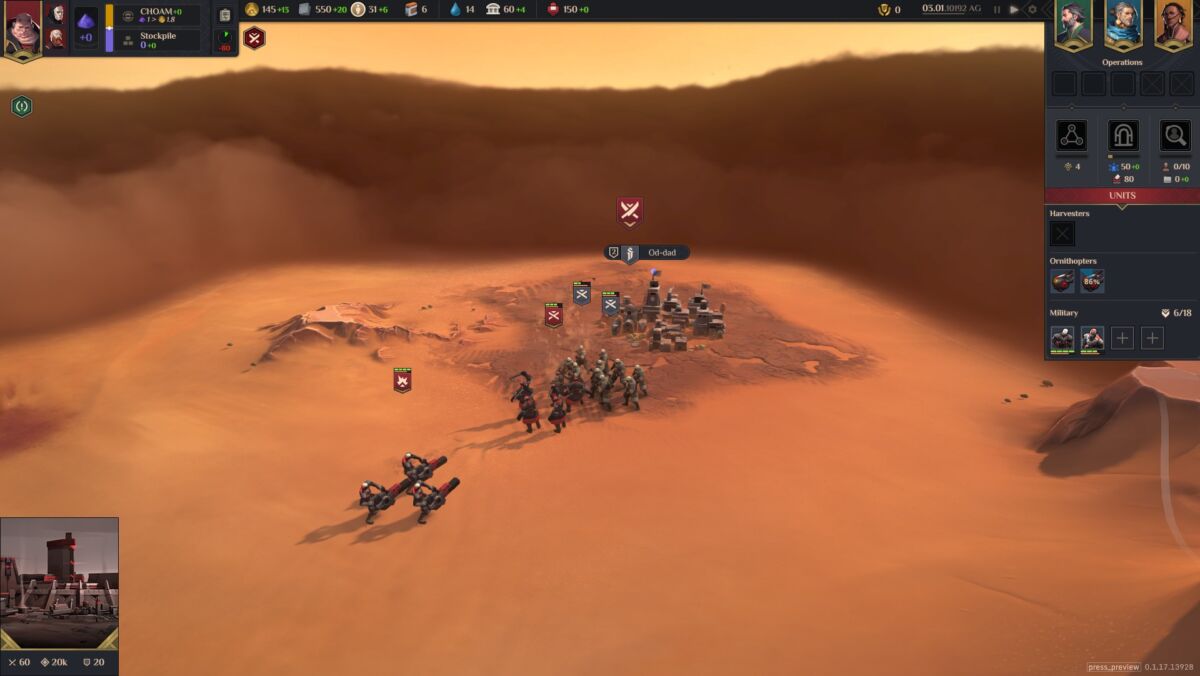
While units may not produce anything themselves, your military forces are a resource that allows you to directly enact your will and see your strategic vision succeed, as well as respond to enemy threats and maneuvers. All factions have five units in their rosters, though more can be unlocked through technology or through the Landsraad Council system. All units will be recruited at the main base.
Units themselves have several important statistics to manage: power, health, armor, special ability, and supplies. Power represents how hard the unit hits in combat, health is the overall durability of a unit, armor is the unit’s ability to mitigate incoming damage, and the special ability defines the unit’s battlefield role.
The most vital element to keep track of is the supplies meter, which is the abstract representation of your army’s logistics system to keep your units operating. Supplies drain pretty quickly when outside of owned territory and can only be refilled when next to a village or the main base. Supplies and supply drain can be modified through technology and unit abilities.
Knowledge
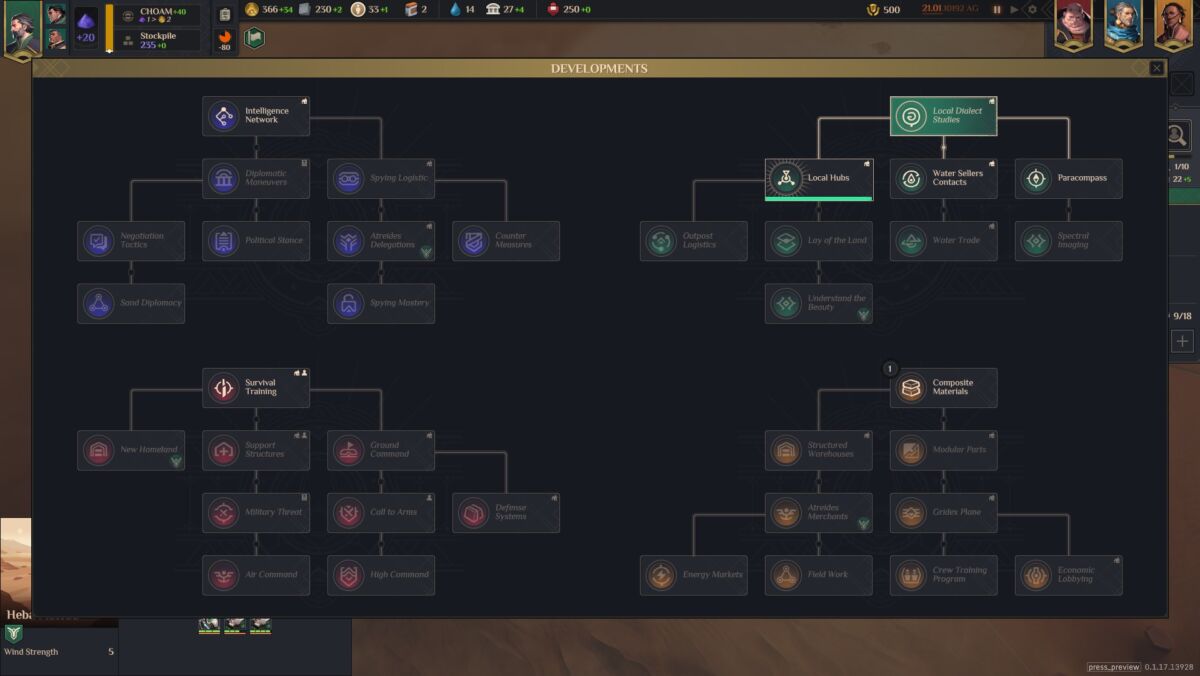
Knowledge is the faction’s ability to learn, adapt, and develop new systems to better survive on Arrakis. In other words, it’s your research rating. Knowledge production can be increased by building structures, researching technology, and bonuses from agent traits.
Influence
The Influence resource represents your faction’s ability to carry out its political win in the Landsraad, activate its special abilities, or even recruit special units. You receive Influence from structures, trading with other factions, agent infiltration assignments, as well as agent missions.
Votes
Votes are only used in the Landsraad council and act as points you can assign to resolutions in the Landsraad Council you agree with or don’t want to pass altogether. Your Votes pool is affected by your faction’s Landsraad Standing.
Agents
Agents are your faction’s spies, emissaries, and special characters that can be assigned to a variety of missions, such as allying with Sietches, infiltrating factions and organizations, or counterespionage operations. All agents come with at least one trait, which can boost their performance or increase your faction’s overall resource gain.
You will recruit new agents at a passive rate, though you can increase this rate through technology or agent traits. However, you can only ever have a maximum of ten agents at any one time.
Intel
The Intel resource represents your faction’s knowledge, secrets, and reconnaissance that give you an edge over the other factions. This resource is used to enact missions that will trigger certain effects on regions or even on other factions. You can gain Intel from passive region features, interacting with points of interest, agent infiltration assignments, and finally trade with other factions.
Dune: Spice Wars is all about resources, as those who can best optimize their resource streams will ultimately prevail in controlling Arrakis. Which resources will you prioritize in your bid for power and influence over Dune?
Dune: Spice Wars is available on PC.
READ NEXT: 10 Most Underrated Strategy Games Of All Time
Some of the coverage you find on Cultured Vultures contains affiliate links, which provide us with small commissions based on purchases made from visiting our site.
